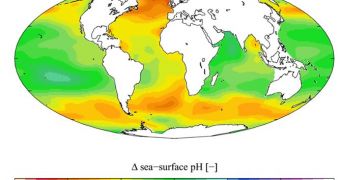As the 2009 UN Climate Summit (COP15) resumes in Copenhagen today, more and more officials from the 190 countries involved in the discussions keep flying to the Danish capital. Today, the Secretary of State for Environment, Food and Rural Affairs of the United Kingdom, Hilary Ben, is scheduled to hold a speech in front of the General Assembly, in which he will underline the importance of stopping ocean acidification, and of finding new ways of fighting it. The UK believes that the situation is growing increasingly desperate, and that immediate action is needed in this matter.
According to the BBC News, the Secretary will also emphasize the importance of cutting down greenhouse-gas (GHG) emissions, as a way of curbing the effects that man-made pollution has on the world's oceans. Carbon dioxide (CO2) – the main gas associated with global warming and climate change – is getting less and less absorbed in the world's waters, as the oceans begin to reach their natural limits. This means that more and more carbonic acid is formed, which increases the overall pH of the seas, experts say.
This, in turn, causes significant damage to marine ecosystems such as coral reefs. These begin to bleach as the water gets more acid in it, becoming an easy target for invading algae, and depriving the fish species that have always lived close to them of their natural habitat. The warming and acidification of the waters can already be seen in the Mediterranean Sea, one of the most used and polluted in the world. Fish stocks are dwindling here, and some species are already about to go extinct in the region. Most of the damage is owed to increased pollution and warming water.
“We know that the increasing concentration of [atmospheric] CO2 is making the oceans more acidic. It affects marine life, it affects coral, and that in turn could affect the amount of fish in the sea – and a billion people in the world depend on fish for their principal source of protein. It doesn't get as much attention as the other problems; it is really important,” Ben told the British news agency. The conference at which the Secretary will be speaking was organized by California-based Stanford University and Scripps Institution of Oceanography.
“Unlike global warming, which can manifest itself in nuanced, complex ways, the science of ocean acidification is unambiguous. The chemical reactions that take place as increasing amounts of carbon dioxide are introduced to seawater have been established for nearly a century,” Andrew Dickson, who is a professor of marine chemistry at Scripps, explains.

 14 DAY TRIAL //
14 DAY TRIAL //